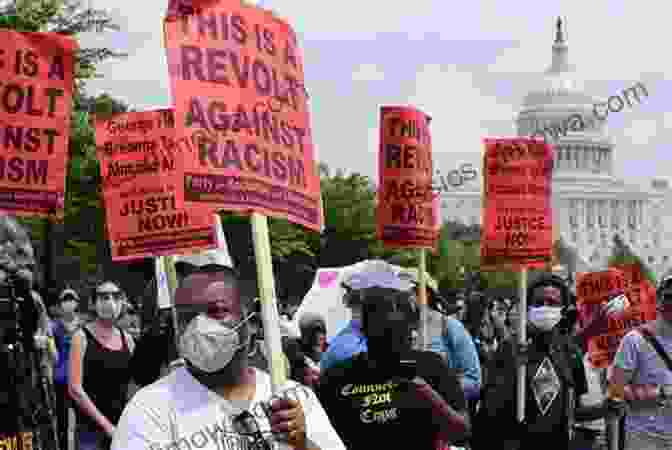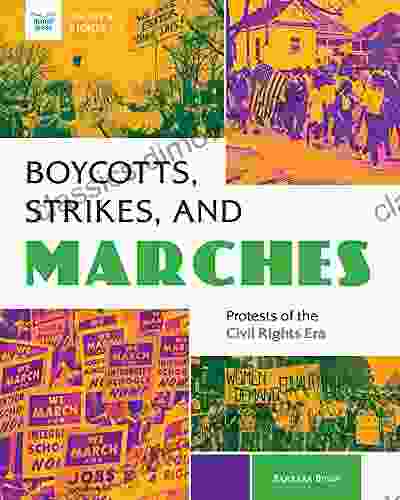Protests of the Civil Rights Era: A Historical Account of the Struggle for Equality


The Civil Rights Era in the United States marked a transformative period characterized by widespread protests and activism aimed at dismantling racial segregation and discrimination. These protests, rooted in the principles of nonviolent resistance and civil disobedience, played a pivotal role in shaping the course of the movement and ultimately securing fundamental rights for African Americans.
This article delves into the historical context, key events, strategies, and leaders that defined the protests of the Civil Rights Era. Through vivid descriptions, historical analysis, and the examination of iconic moments, we aim to shed light on the profound impact of these protests on American society and the ongoing pursuit of racial equality.
4.2 out of 5
| Language | : | English |
| File size | : | 71299 KB |
| Screen Reader | : | Supported |
| Print length | : | 112 pages |
| Lending | : | Enabled |
| Paperback | : | 32 pages |
| Grade level | : | 7 - 9 |
| Item Weight | : | 3.52 ounces |
| Dimensions | : | 8.5 x 0.08 x 11 inches |
Historical Context
The Civil Rights Era emerged within a climate of systemic racism and oppression that had persisted in the United States since the abolition of slavery. Despite the ratification of the 14th and 15th Amendments, which granted African Americans citizenship and the right to vote, segregation and discrimination remained deeply ingrained in American society. This systemic inequality manifested in various forms, including segregation in housing, education, and public accommodations, as well as the denial of voting rights and economic opportunities.
In this context, a growing number of African Americans, galvanized by the leadership of courageous individuals and organizations, began to challenge these injustices through organized protests and acts of civil disobedience.
Key Events
Montgomery Bus Boycott (1955-1956)
The Montgomery Bus Boycott, sparked by Rosa Parks' refusal to give up her seat to a white passenger, became a turning point in the Civil Rights Movement. Led by Martin Luther King Jr. and the Montgomery Improvement Association, the boycott lasted over a year and successfully pressured the city to desegregate its buses.
Little Rock Nine (1957)
The Little Rock Nine were a group of African American students who enrolled at the previously all-white Central High School in Little Rock, Arkansas. Their attendance sparked violent protests and required the intervention of President Dwight Eisenhower to ensure their safe passage to and from school.
March on Washington (1963)
The March on Washington, organized by A. Philip Randolph and Bayard Rustin, brought together over 200,000 people from across the country to demand equal rights for African Americans. Martin Luther King Jr. delivered his iconic "I Have a Dream" speech, which resonated with the nation and helped galvanize support for civil rights legislation.
Selma to Montgomery Marches (1965)
The Selma to Montgomery Marches, led by Martin Luther King Jr. and the Southern Christian Leadership Conference (SCLC),sought to secure voting rights for African Americans in Alabama. The marches faced violent resistance from local law enforcement but ultimately led to the passage of the Voting Rights Act of 1965.
Strategies
Nonviolent Resistance
Nonviolent resistance emerged as a defining strategy of the Civil Rights Movement. Inspired by the teachings of Mahatma Gandhi, activists believed that peaceful protests and civil disobedience could effectively challenge unjust laws and practices without resorting to violence.
Economic Boycotts
Economic boycotts, such as the Montgomery Bus Boycott, proved to be powerful tools for exerting pressure on businesses and governmental entities that enforced segregation and discrimination. By withholding patronage and economic support, activists aimed to inflict financial harm and force concessions.
Civil Disobedience
Civil disobedience involved intentionally breaking unjust laws as a form of protest. By violating segregation laws and defying authority, activists sought to highlight the absurdity and immorality of such laws and provoke a response from policymakers and the general public.
Leaders
Martin Luther King Jr.
Martin Luther King Jr., a Baptist minister and civil rights leader, became the most prominent spokesperson for the Civil Rights Movement. His leadership, rooted in the principles of nonviolence and love, inspired countless Americans and played a crucial role in shaping the movement's goals and strategies.
Rosa Parks
Rosa Parks, an African American seamstress, sparked the Montgomery Bus Boycott with her refusal to give up her seat to a white passenger. Her act of defiance became a catalyst for change and helped launch the Civil Rights Movement into the national spotlight.
Bayard Rustin
Bayard Rustin, a Quaker activist, played a pivotal role in organizing the March on Washington. His expertise in nonviolent protest tactics and his ability to bridge divides between different groups were instrumental in ensuring the march's success.
Impact
The protests of the Civil Rights Era had a transformative impact on American society and the ongoing pursuit of racial equality. Through their unwavering commitment to nonviolence, economic boycotts, and civil disobedience, activists forced the nation to confront the injustices of segregation and discrimination.
The passage of landmark legislation, such as the Civil Rights Act of 1964 and the Voting Rights Act of 1965, provided legal protections against discrimination and expanded voting rights for African Americans. These legislative victories were directly attributable to the tireless efforts of protesters and activists during the Civil Rights Era.
Beyond legislative changes, the protests and activism of this period raised awareness about the plight of African Americans and shifted public opinion in favor of racial equality. The courage and determination of protesters inspired future generations to continue the fight for justice and equality.
The protests of the Civil Rights Era stand as a testament to the power of nonviolent resistance and civil disobedience in challenging systemic injustice. Through their unwavering commitment to peaceful protest, economic boycotts, and civil disobedience, activists during this period made significant strides towards dismantling segregation, securing voting rights, and expanding opportunities for African Americans.
The protests of the Civil Rights Era continue to serve as a source of inspiration and guidance for activists and social movements around the world. Their legacy reminds us that even in the face of adversity, peaceful protest and collective action can be powerful tools for achieving social change and promoting a more just and equitable society.
4.2 out of 5
| Language | : | English |
| File size | : | 71299 KB |
| Screen Reader | : | Supported |
| Print length | : | 112 pages |
| Lending | : | Enabled |
| Paperback | : | 32 pages |
| Grade level | : | 7 - 9 |
| Item Weight | : | 3.52 ounces |
| Dimensions | : | 8.5 x 0.08 x 11 inches |
Do you want to contribute by writing guest posts on this blog?
Please contact us and send us a resume of previous articles that you have written.
 Book
Book Novel
Novel Page
Page Chapter
Chapter Text
Text Story
Story Genre
Genre Reader
Reader Library
Library Paperback
Paperback E-book
E-book Magazine
Magazine Newspaper
Newspaper Paragraph
Paragraph Sentence
Sentence Bookmark
Bookmark Shelf
Shelf Glossary
Glossary Bibliography
Bibliography Foreword
Foreword Preface
Preface Synopsis
Synopsis Annotation
Annotation Footnote
Footnote Manuscript
Manuscript Scroll
Scroll Codex
Codex Tome
Tome Bestseller
Bestseller Classics
Classics Library card
Library card Narrative
Narrative Biography
Biography Autobiography
Autobiography Memoir
Memoir Reference
Reference Encyclopedia
Encyclopedia B D Anderson
B D Anderson Pm Freestone
Pm Freestone Nicole Swirsky
Nicole Swirsky Elizabeth Javidan
Elizabeth Javidan Selraybob
Selraybob Pete May
Pete May Mircea Pitici
Mircea Pitici Michael Jensen
Michael Jensen Debbie Barry
Debbie Barry Austin E Quigley
Austin E Quigley Farley Granger
Farley Granger Gregory Farmer
Gregory Farmer Dat Nishiwaki
Dat Nishiwaki Luke Mckenna
Luke Mckenna Salim Lamrani
Salim Lamrani Barbara Henderson
Barbara Henderson Babs Omotowa
Babs Omotowa Jennifer Chambliss Bertman
Jennifer Chambliss Bertman Audrey Sauble
Audrey Sauble Lisa Damian Kidder
Lisa Damian Kidder
Light bulbAdvertise smarter! Our strategic ad space ensures maximum exposure. Reserve your spot today!

 Samuel Taylor ColeridgeJust Friends: A Story of Love, Loss, and the Unbreakable Bonds of Friendship
Samuel Taylor ColeridgeJust Friends: A Story of Love, Loss, and the Unbreakable Bonds of Friendship
 Julio Cortázar"Intuitive Concepts in Elementary Topology": Unveiling the Intricacies of...
Julio Cortázar"Intuitive Concepts in Elementary Topology": Unveiling the Intricacies of...
 Emmett MitchellThe Ultimate Guide to Nurturing Gifted and Talented Children: Discover the...
Emmett MitchellThe Ultimate Guide to Nurturing Gifted and Talented Children: Discover the... Harry HayesFollow ·2.1k
Harry HayesFollow ·2.1k Albert CamusFollow ·13.1k
Albert CamusFollow ·13.1k Hudson HayesFollow ·5.8k
Hudson HayesFollow ·5.8k Gary CoxFollow ·15.7k
Gary CoxFollow ·15.7k Adrien BlairFollow ·7.9k
Adrien BlairFollow ·7.9k Easton PowellFollow ·4.3k
Easton PowellFollow ·4.3k Ian PowellFollow ·7.8k
Ian PowellFollow ·7.8k Donald WardFollow ·17.5k
Donald WardFollow ·17.5k

 Marcus Bell
Marcus BellHigh Lonesome: A Literary Journey into the Heart of the...
<p>Hannah weaves a intricate...

 Gabriel Hayes
Gabriel HayesRediscover Gideon Green's Timeless Adventures in "Gideon...
Embark on an Extraordinary Journey with...

 Samuel Taylor Coleridge
Samuel Taylor ColeridgeEscape to a Literary Haven: Discover the Enchanting World...
Embark on an Extraordinary Literary...
4.2 out of 5
| Language | : | English |
| File size | : | 71299 KB |
| Screen Reader | : | Supported |
| Print length | : | 112 pages |
| Lending | : | Enabled |
| Paperback | : | 32 pages |
| Grade level | : | 7 - 9 |
| Item Weight | : | 3.52 ounces |
| Dimensions | : | 8.5 x 0.08 x 11 inches |












